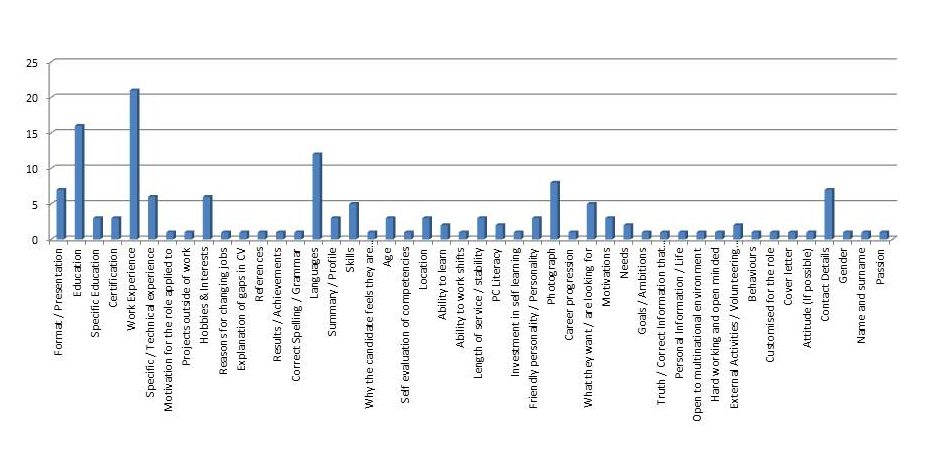
Recruiters, what are the five things you seek on a candidate’s CV?
Languages featured quite highly on the list; 12 out of 35 companies selected languages as one of their ‘5 Things’.
By Paul Myers from People Matter, a specialist consulting organisation
Recently I attended the Profesia Days event in Prague, where I was part of a group of recruiters providing CV Advice to job seekers. I have to admit, I hate giving out CV advice. I hate the thought of someone listening to me and my idea of what makes a great CV, them making wholesale changes, and then still not being successful in finding a new role, coming back to me stating “you told me to change this and that and I still don’t have a job”.
It’s a long read, you have been warned!
Prior to the event, I had what I thought was an epiphany…..then I realised that actually no, no it was just a question that I thought perhaps none of the other recruiters in the CV advice area were asking themselves….. What good is it, to provide CV advice to the job seekers, if you don’t know which companies the jobseekers want to join and what the companies in attendance are looking for in a CV?
I decided to embark upon the most un-scientific piece of research ever…..to find out what makes the perfect CV! I decided I would speak with the companies attending the event and ask them one simple question.
“What five things do you expect to see on a candidate’s CV?”
Now, that’s a very broad question I hear you say, and I agree with you 100%. There are so many things that are important to include within a CV however, I asked my question as I was curious to see what would be the most common answers and to see if there were any differences between companies from different industries and even differences between recruitment agencies and corporate organisations.
Well then….. hmm, what can I say, poorly thought out, poorly executed without any comparison between companies of different industries however, following my little experiment, there are actually some interesting points worth sharing.
The Data:

Dissecting the data:
So here comes the rather unstructured and non-scientific part where I attempted to translate this data into something meaningful!
Despite 9 companies not being able to fully answer the question, not being able to give ‘5 things’ the data shows a clear preference from the companies to have the following information ranked from highest to lowest:
- Work Experience
- Education
- Languages
- Photograph
- Format & Presentation / Contact Details
To put things into perspective however, with just 35 companies approached with the same question there were 46 different things that companies expected to see on the CV. Some of these 46 things were near on impossible to find within a CV, perhaps geared more to an interview however, it was an interesting insight in to what (a few) companies think about CV’s in the Czech Republic
Let’s analyse things a little more deeply.
Work Experience vs Specific Experience:

Out of the 35 companies approached 77% of these companies were interested in either seeing general work experience or specific experience related to the role the person was applying for.
Does that mean that 23% of the organisations present do not care about a candidate’s experience? I think generally most companies do want to see experience on a CV however; I did have a discussion with an organisation who simply stated, “If a candidate speaks English with XYZ languages, we will hire them!”
The split between general work experience and specific work experience was also something to note:
- Work Experience = 78%
- Specific Experience = 22%
This came as a surprise as regardless of industry, most companies we work with, always request some specific experience related to the position they have asked us to find someone for whether it’s technical, financial, sales or operational. I can’t for one minute imagine a client asking us to find candidates without specifying experience, although if they did, wouldn’t recruitment be such an easy thing to do! J
Education vs Certification:
It is interesting that of the companies approached and asked the question, 49% were either technical or engineering companies, despite what we commonly hear about the need for a technical education for roles with some of those types of companies, a technical / industry specific education was only mentioned by 3 companies which perhaps suggests, that experience is therefore more important than education.
In one case, there was a requirement for fresh graduates with language skills, but the relevance of the university studies wasn’t important, it was more important that potential candidates show the ability to learn.
Only three companies mentioned certification (which is different from education) for specific roles e.g., electrical engineer positions. Generally it seems the more specific the requirement, the more likely there is a need for certification, but with many companies present at the event hiring for multiple positions, it’s wasn’t really the most important factor.
So where do you stand on the requirements for education to be suitable for a particular role?
On many occasions I have discussed the need for education or certification with hiring managers and whilst I accept and agree that for certain roles a candidate needs to specific qualifications, I also believe that the experience and the potential to perform are far more important.
Languages:

Languages featured quite highly on the list; 12 companies selected languages as one of their ‘5 Things’.
Interestingly, a few of these companies were from outside of Prague and a common theme came up about finding out how good someone’s language skills really are, with a problem of local candidates providing details of advanced language skills but then not being able to demonstrate this at interview, wasting time.
I have previously invested in video interviews to enable companies to get a better picture of someone’s language capabilities. If needed, you can invest in online assessments that can check both verbal and written language skills. Alternatively, you could perhaps utilise internal team members who have the language skills, to assess a candidate’s language abilities before inviting them for interview. It will save on those wasted hours interviewing candidates who don’t meet the level required.
Another point to note was however, a level of reluctance from some companies to entertain the possibility of relocating candidates (with the right level of language skills) from abroad. So whilst the Czech Republic has the lowest unemployment rate in Europe, and it appears to be difficult in finding Czech based candidates with the right language skills, some companies are still not willing to invest in hiring talent from outside.
These companies are surely limiting their international competitiveness and will fall further behind their competition until they realise that the companies who recognise attracting international talent as an essential hiring strategy, are leading the way.
Photographs:

Paul Myers
Well…….where to start with this one? I’m still surprised after 9 years in the Czech recruitment industry, that photographs are still expected.
On the day, there were a few companies who stated, they want to see how the person represents themselves, whether the picture is a selfie or a professional head shot. One company (and I’m ashamed to say it was a recruitment agency) advised, “we hire for lots of management positions so we need to see what they look like!” with no other justification or reason.
At the risk of upsetting a number of companies I want to categorically state that a candidate does not to include their photograph on their CV. Think about it for just a moment, if it was you, would you want to give someone an opportunity to discriminate against you immediately?
Let’s take for example the experienced customer service agent who has years of experience providing phone based support for external customers, customers that he or she will never meet; why on earth would that person need to provide a photo on their CV?
I’ve been recruiting for long enough now to know that a picture on a CV is going to be the first thing that catches a recruiter or hiring manager’s eye, and that the recruiter or hiring manager is immediately going to form an opinion of a candidate based on that picture before even reading the CV or meeting the candidate.
So, especially for any candidates out there reading this; Candidates DO NOT need to provide a photo on your their CV if they do not want to. They should not be expected to run the risk of being discriminated against based on how they look.
Format / Presentation & Contact Details:
Only 20% (7 out of 35) of companies thought that the format and presentation of the CV was important. Of those companies, only one company was able to summarise that they would like to see; a profile / statement at the top of the CV, have working experience in chronological order with short bullet points, followed by education, with an expansion of their personal interests and hobbies.
There are all sorts of science behind things like the Flesch-Kincaid Readability Index, perhaps if candidates used tools like that to help them evaluate the readability of their CV, they might be able to write it more effectively in a manner that could meet the needs of the recruiter / hiring manager.
A tip for candidates: The easier the readability of your CV, the more likely the recruiter will be calling you. A grade 7 on the Flesch-Kincaid scale should just about do it! J
The same number of companies (albeit not necessarily the same ones) also commented on the need for candidates to provide their contact details within their CV.
A note to candidates here; many companies are simplifying the application process so that you are not filling in endless pages of an application form. Whilst one click apply, simply uploading a CV or applying though LinkedIn or Facebook is becoming more and more common, please ensure you always have your contact details on the CV.
Not all recruiters are smart enough to cross reference your CV with your online profiles, some are smart enough but can’t be bothered to take the time to do so, and it can lead to frustration on both sides. The recruiter thinks you’re great but can’t contact you; you’ve applied but hear nothing back from the recruiter getting a bad impression of the company.
If you’re not bored yet, then read on to find out what else has been discovered in this amazing piece of research:
What Else?
Along with the key ‘5 things’ above, there are a number of suggestions (I mentioned before that there was 46 different ‘things’) that were made. Some of the suggestions were somewhat surprising, some were a little random, and I believe there’s definitely room for one or two more.
Let’s take a look.
Hobbies & Interests:

Whilst not in the top ‘5 things’, hobbies and interests were mentioned by a few companies and it’s an area that draws some different opinions about why candidates should detail them.
Some companies want to see whether a candidate has interests that complement the industry or technologies for which they are applying. Other companies want to see if an individual engages in group activities or singular activities as it may allure to someone who is either a good team player or can work autonomously.
In some cases, hiring managers like to see these as a way of understanding how they might be able to provide a candidate with an instant feeling of inclusion, for example, candidate A indicates they like Salsa dancing – employee F likes Salsa dancing, so it might be good to introduce the candidate to the employee early on to help them build some relationships.
There was one company who would like to see an expansion of hobbies and interests. By this they meant that if someone was in to dancing, they’d like the individual to state which type of dancing – Salsa anyone?
Skills:
It was interesting that there were not many companies that were too interested in skills. After all, reading about someone’s experience (which is usually a few bullets about what the candidates responsibilities were) generally tells you someone has experience in a similar working environment, but does it tell the company that the candidate will be successful in their role.
There’s a question that’s been burning a hole in the back of my head for a while now (I blame it for my baldness). Do recruiters / hiring managers just want a candidate who can fill a gap, or do they want someone who will be successful, someone who will add value, will contribute to the development and growth of team and help enhance the business through their actions?
I have one thing I do in every vacancy briefing I take. I ask the hiring manager what they want to see, that will make someone successful in the role. This means I’ve always been a big fan of CV’s in which a candidate makes it very clear about what skills they have, and also gives details about their results / achievements and successes to date. It gives me a far better indication of whether someone is likely to be successful in the role I am hiring for, which usually means a greater fit for both the candidate and the company, resulting in a great hire.
At the same time, if those key elements are missing from a candidate’s CV, but there is a general match, it just means I need to find out more from the candidate and provide the hiring manager with more information in addition to the CV.
What Are Candidates Looking For / Motivations:
There’s an argument presented by some companies that what someone is looking for and what their motivations are, can be included in a cover letter. I agree, absolutely however, given the ongoing debate as to whether recruiters actually read cover letters or not, and the simplification of the application process in many companies, is there really a need for a cover letter?
The one thing that is sure to be read (if not screened out by an automated ATS that parses information, picking out key words that may or may not have been included) is the CV. So why wouldn’t a candidate want to include this on their CV.
Are companies stuck in their ways?
There are companies that are a bit stuck in their ways when it comes to recruitment, they’re slow and steady and they get there finally, but they are fixated on whether the candidate is right for them. It takes them so much time to hire someone. They’re bound by rules, by salary bandings and by a culture that wants to test every candidate to see if they match what the company is looking for. As long as that person matches them, they will offer the role to them.
There are however more forward thinking companies that are interested in what motivates the candidate, they understand what the candidate is looking for, they imagine the needs of the individual, and before embarking on a journey with them, they take the time to see not only if the candidate fits them, but to see if they fit the candidate. They understand that recruitment is very much a two way process and that the company will be assessed by the candidate as much as they are assessing the candidate.
Personally, I have a strong preference for seeing what a candidate is looking for and and what their motivations are, within the CV. It usually comes within the profile or personal statement. You’ll often see words such as ‘Motivated by’ ‘Interested In’ ‘Enjoys’ ‘Likes’ and so on. It gives me some areas to focus on the individual during an interview. It also shows the individual I have an interest in them, I have read the CV and I am interested in understanding their needs and motivations.
The OMG Moments:
Yes there were some moments where I almost face palmed (but UI thought it would be rude to do it in front of them), when asking the ‘5 things’ question.
Amazingly, these were more common when I was talking with the recruiters from recruitment agencies. I find it hard to believe that in this day and age, some recruiters are still in the dark ages despite being a good deal younger than myself (an assumption, especially as I still look very young!!) and having been brought up in a society wrapped in cotton wool and full of political correctness.
Age!:
In all seriousness, an energetic, friendly and clearly younger than myself recruiter was quite happy to tell me that they wanted to see the date of birth or at least see the age in someone’s CV. I asked why they felt this was important and perhaps realising what they had just said, they quickly moved on to another topic. Now I get it…., if you are recruiting for a team full of 20 somethings, and you have an application from a 40 something, you’re likely to think twice about the cultural fit and chemistry within the team………you’re discriminating!
One of the best hiring managers I’ve worked with had a team that consisted of fresh graduates providing fun and excitement, experienced and ambitious go-getters creating the drive and forward momentum, and someone close to retirement who was the gel that kept the team together with their calming influence. Age is just a number, a pretty irrelevant one too……except when you want to get served alcohol of course!
Gender!:
Really? Come on! One individual advised they would like to see the gender of the individual. This wasn’t an issue for all CV’s however, this was only because there were some candidates from abroad and the individual could not tell if they were male or female…….and………..well that was it really. It’s discrimination!
I’m sure if that recruiter were to pick up the phone and have a conversation about the opportunity with the candidate; they would quickly work it out (unless of course they had a strangely gravelly voice or perhaps an unusual high pitched tone).
Regardless of whether someone is a good match for the role or not, relating to skills, experience, motivations etc, gender is irrelevant.
Summary:
I’m not sure there’ll be any companies out there that would want to know my thoughts but I’ll share anyway.
It should by now be clear to anyone reading this that not only was this experiment poorly thought out and executed, but there are in fact no meaningful results that show any relevance based on type of company or industry, nor is there a wealth of information that will help candidates write the perfect CV.
Why not?
Well put simply, the perfect CV does not exist. There is not one format that suits all. Different recruiters / hiring managers are attracted to different styles of writing, have different ideas about what they want to see on a CV and, it’s clear that rejection based on discrimination regarding information within a CV is still a risk.
The only constant in all this, is in fact the difference of opinion, which does show that candidates need to customise their CV for each application they make. With so many differing requirements from company to company, it is impossible to rely on having one CV to send out to multiple opportunities / companies.
If I were to give any real advice for jobseekers, it would be to target specific companies that you want to work for. Find out who the people in the company are, those who are doing the same job you would like to do and also their line managers. Connect with them, tell them you’re thinking about joining that company and you want find out what’s involved, what skills and experience is really needed, then write your CV in a customised manner for each position you are interested in but….don’t fabricate experience or skills, demonstrate and show those that can be transferred, and show them your potential to be successful in the role.
Ok so I did warn you it was a long read and early on in this piece, I did mention it was an un-scientific piece of research, so if you made it this far, you’re either really bored at work or, you’ve actually now found a reason to ban me from your LinkedIn feed.
Thanks to Dominic Williams who had to go through the pain of proofreading this article before it was published.

